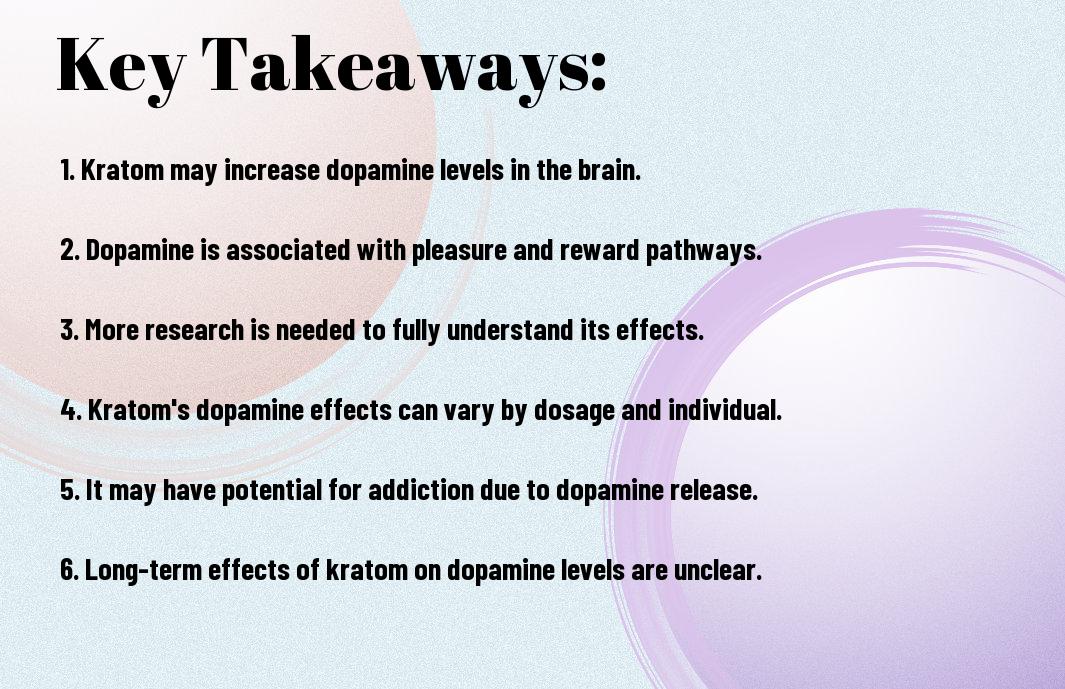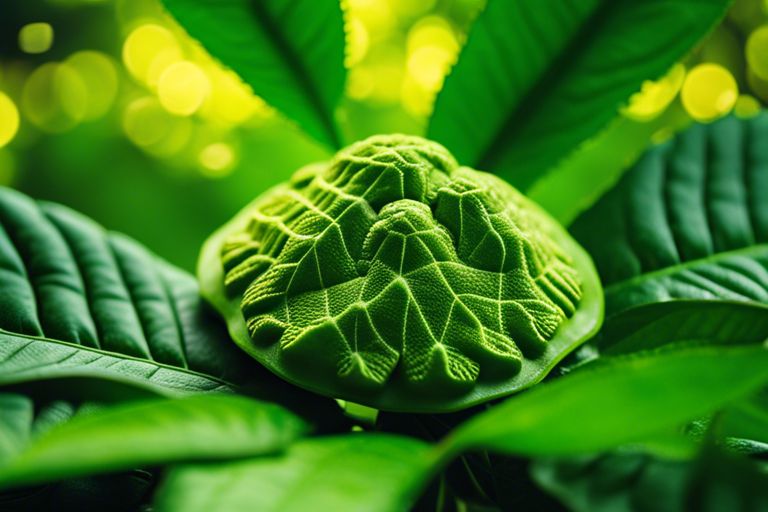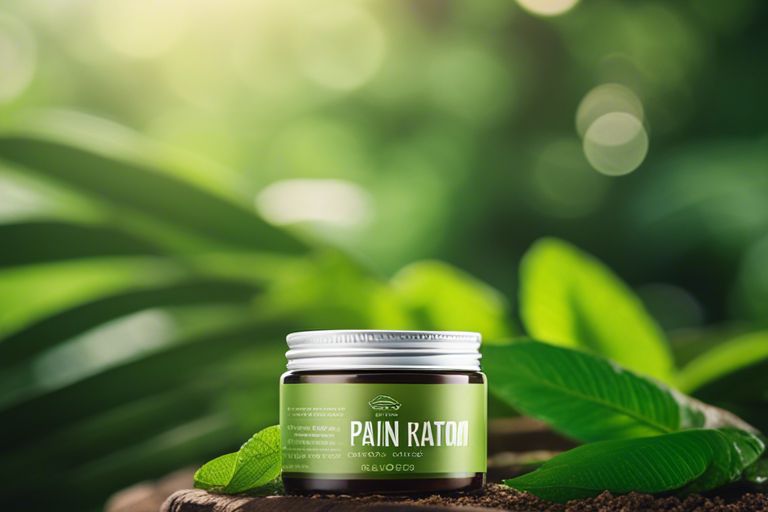It’s a question that has sparked curiosity and concern among many who are exploring the effects of this popular botanical substance. As we probe into the intricate relationship between kratom and dopamine levels, we uncover potential risks and benefits that come with its consumption. Understanding how kratom affects dopamine production is key to making informed decisions about its usage and potential impact on mental health and overall well-being.
Key Takeaways:
- Kratom’s potential impact: Kratom may increase dopamine levels in the brain, leading to feelings of pleasure and reward.
- Mechanism of action: Kratom’s alkaloids interact with brain receptors to increase dopamine release, similar to the effects of other substances like opioids and stimulants.
- Potential risks: While kratom’s dopamine-boosting effects may have benefits for some users, there are concerns about addiction, tolerance, and withdrawal symptoms associated with its use.

What is Dopamine?
The neurotransmitter dopamine plays a crucial role in the brain’s communication system. It is associated with pleasure, reward, and motivation. Dopamine is released when the brain is expecting a reward, driving us to seek out activities that fulfill our desires.
The Role of Dopamine in the Brain
On a physiological level, dopamine helps regulate movement, emotional responses, and our ability to experience pleasure and pain. It also plays a role in decision-making and reinforcement learning, influencing our behaviors and choices.
Dopamine’s Impact on Mood and Motivation
What makes dopamine intriguing is its connection to our mood and motivation levels. When dopamine levels are balanced, we experience feelings of pleasure and satisfaction, which can drive us to continue engaging in certain activities. However, imbalances in dopamine levels can lead to various mental health conditions.
For instance, low levels of dopamine have been linked to depression and mental fatigue, while excess dopamine is associated with addictive behaviors and psychotic disorders. Striking a balance in dopamine levels is crucial for maintaining optimal mental and emotional well-being.
What is Kratom?
One of the most buzzed-about natural supplements in recent years is kratom. This tropical evergreen tree, scientifically known as Mitragyna speciosa, is native to Southeast Asia and is a member of the coffee family. Kratom has gained popularity in the West for its potential therapeutic effects, including pain relief, mood enhancement, and increased focus and energy.
Origins and History of Kratom
With origins dating back centuries, kratom has been used traditionally in countries like Thailand, Indonesia, and Malaysia for its stimulant and pain-relieving properties. In Southeast Asia, kratom leaves were often chewed or brewed into tea by laborers to combat fatigue and improve productivity. The plant also played a significant role in cultural and religious practices in these regions.
Chemical Composition and Effects
On the chemical level, kratom’s leaves contain compounds called alkaloids, with mitragynine and 7-hydroxymitragynine being the most abundant and biologically active. These alkaloids interact with opioid receptors in the brain, producing effects that can range from pain relief and relaxation to increased energy and euphoria. While kratom’s stimulating properties are often compared to those of coffee, its sedative effects can be likened to opioids.
Composition: The combination of alkaloids in kratom leaves gives rise to its diverse range of effects, making it a popular choice for individuals seeking natural alternatives to manage chronic pain, anxiety, and other conditions. However, it’s important to highlight that kratom’s potential for addiction and dependency has raised concerns among healthcare professionals and regulatory agencies.
The Connection Between Kratom and Dopamine
How Kratom Affects Dopamine Levels
An important neurotransmitter in the brain, dopamine plays a crucial role in regulating mood, cognition, motivation, and movement. Kratom, a traditional herb known for its stimulating and pain-relieving effects, may interact with the brain’s dopamine system. When consumed, kratom’s active compounds bind to opioid receptors in the brain, which may indirectly lead to an increase in dopamine levels.
The Science Behind Kratom’s Dopamine-Boosting Effects
Kratom’s impact on dopamine levels stems from its interaction with the brain’s opioid receptors. These receptors are involved in regulating pain, pleasure, and reward pathways. By binding to these receptors, kratom may trigger the release of dopamine, leading to feelings of euphoria and well-being. However, this dopamine surge can be addictive and may lead to dependence and withdrawal symptoms in some individuals.
Levels of dopamine in the brain are tightly regulated, and any substance that disrupts this balance can have significant effects on mental and physical health. While kratom may provide temporary relief from pain and elevate mood, it is important to use it cautiously and be aware of its potential impact on dopamine levels.
Benefits of Increased Dopamine with Kratom
Many people who use kratom report experiencing a variety of benefits from the increase in dopamine levels that the herb can provide. Some of the key advantages include improved mood, reduced anxiety, enhanced motivation, productivity, and potential therapeutic applications.
Improved Mood and Reduced Anxiety
Improved dopamine levels can lead to an overall sense of well-being and happiness. By increasing dopamine, kratom may help alleviate symptoms of depression and anxiety, providing users with a more positive outlook on life. Additionally, the herb’s potential anxiolytic effects may contribute to a reduction in stress and improved emotional stability.
Enhanced Motivation and Productivity
With increased dopamine levels, individuals may experience heightened motivation and improved productivity. This can lead to better focus, concentration, and drive to accomplish daily tasks. Users of kratom often report feeling more energized and proactive in pursuing their goals and responsibilities.
Understanding the relationship between dopamine and motivation is crucial for those seeking to enhance their productivity levels. By utilizing kratom to increase dopamine, individuals may be able to overcome feelings of lethargy and procrastination, ultimately leading to a more fulfilling and successful lifestyle.
Potential Therapeutic Applications
Applications of kratom as a potential therapeutic agent are being explored for various conditions. The herb’s ability to increase dopamine levels may offer promise in treating disorders such as Parkinson’s disease, ADHD, and addiction. Kratom’s potential to modulate dopamine levels could provide a natural alternative for individuals seeking relief from these conditions.
Potential Risks and Side Effects
Despite its potential benefits, using kratom comes with some risks and side effects that individuals should be aware of. It’s imperative to understand the potential consequences of altering dopamine levels in the brain through kratom use.
Dopamine Imbalance and Addiction
Imbalance in dopamine levels caused by kratom use can lead to addiction. Kratom interacts with the brain’s reward system, increasing dopamine levels and creating a pleasurable sensation. This can result in dependence and the urge to continue using kratom to maintain those elevated dopamine levels. Long-term use may further disrupt dopamine balance, leading to cravings, withdrawal symptoms, and a cycle of addiction.
Interactions with Other Substances and Medications
Interactions between kratom and other substances or medications can have dangerous consequences. Combining kratom with substances that also affect dopamine levels, such as stimulants or certain antidepressants, can lead to overstimulation of the brain and potentially harmful side effects. It is crucial to consult with a healthcare provider before using kratom, especially if you are taking any other medications.
Side effects of kratom use may include nausea, constipation, dizziness, and increased heart rate. In some cases, kratom has been associated with more severe side effects, such as seizures, liver damage, and respiratory depression. These risks highlight the importance of using kratom responsibly and being aware of potential interactions with other substances or medications.
Short-Term and Long-Term Effects on the Brain
With kratom use, individuals may experience short-term effects on the brain, such as euphoria, relaxation, and increased focus. However, long-term use can have more serious consequences. Chronic kratom use has been linked to changes in brain structure and function, including alterations in dopamine receptors and neurotransmitter levels. These changes can impact mood regulation, cognition, and overall brain health.
Risks associated with long-term kratom use include the potential for developing tolerance, dependence, and addiction. Continued use can also lead to withdrawal symptoms, mental health issues, and cognitive impairment. It is imperative to weigh the potential benefits of kratom against these risks and to approach its use with caution.
The potential for addiction and harmful interactions with other substances highlight the importance of understanding the risks associated with kratom use. Individuals should be cautious and informed when considering using kratom, especially in the context of their overall health and well-being.

Real-Life Experiences and User Reports
Anecdotal Evidence of Kratom’s Dopamine-Boosting Effects
After consuming kratom, many users report experiencing a sense of euphoria, increased energy, improved focus, and enhanced mood. These effects are often attributed to kratom’s ability to boost dopamine levels in the brain. Dopamine is known as the “feel-good” neurotransmitter and plays a crucial role in regulating mood, motivation, and pleasure.
User Reviews and Testimonials
One common theme among user reviews and testimonials is the positive impact that kratom has on their overall well-being. Users often report feeling more motivated, relaxed, and sociable after taking kratom. Some users even claim that kratom has helped them manage symptoms of depression, anxiety, and chronic pain.
For instance, some users caution against using kratom in high doses or for prolonged periods as it can lead to dependency and withdrawal symptoms. It is important to use kratom responsibly and in moderation to avoid potential adverse effects.
Can Kratom Help Increase Dopamine Levels in Individuals with ADHD?
White vein kratom benefits for adhd have been a topic of interest among researchers. Some believe that kratom can help increase dopamine levels in individuals with ADHD, potentially improving focus and attention. While more research is needed, some people with ADHD have reported positive effects from using white vein kratom to manage their symptoms.
Can Kratom’s Effect on Testosterone also Impact Dopamine Levels?
Recent studies have shown that kratom’s impact on testosterone levels may also have an effect on dopamine levels. The potential relationship between these two important chemicals in the body is still being explored, but it raises intriguing questions about the broader impact of kratom on hormonal and neurotransmitter systems.
Summing up
To wrap up, while the effects of kratom on dopamine levels are still being studied, it is clear that the plant’s alkaloids can interact with opioid receptors in the brain. This interaction can lead to a range of effects, including pain relief and mood enhancement. Understanding the complexities of how kratom affects dopamine levels is crucial for making informed decisions about its use and potential risks. For a deeper investigate what kratom really does in your brain and body, check out What Kratom Really Does In Your Brain and Body.
FAQ
Q: What is dopamine and how does it relate to kratom?
A: Dopamine is a neurotransmitter that plays a key role in mood, pleasure, and motivation. Kratom has been suggested to potentially increase dopamine levels in the brain.
Q: How does kratom affect dopamine levels in the brain?
A: Kratom contains active compounds that interact with opioid receptors in the brain, which may indirectly lead to an increase in dopamine release.
Q: What are the potential effects of increased dopamine from kratom consumption?
A: Increased dopamine levels may lead to feelings of pleasure, improved mood, and heightened motivation. However, excessive dopamine activity can also have negative consequences.
Q: Is it safe to use kratom to increase dopamine levels?
A: While some people use kratom for its potential mood-boosting effects, it is important to use it responsibly and be aware of the risks associated with its use, such as dependency and withdrawal symptoms.
Q: Are there other ways to naturally increase dopamine levels without using kratom?
A: Yes, there are several natural ways to boost dopamine levels, such as engaging in regular exercise, consuming foods rich in tyrosine (an amino acid precursor to dopamine), practicing mindfulness and meditation, and getting an adequate amount of sleep.









